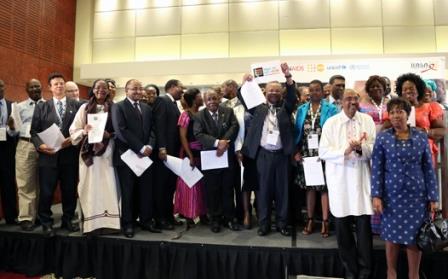|
|
 |
Eastern and Southern Africa’s leaders agree. It’s time to act now on young people’s HIV education and sexual health needs.Cape Town, ICASA Conference, High Level Ministerial and UN Meeting, 07 December 2013
On Saturday 07 December, at a packed meeting of experts and youth activists convened by UNESCO and other UN agencies, political and youth leaders from 21 countries in Eastern and Southern Africa reached an historic agreement in the response to HIV. Recognising the urgency of the situation facing young people, education and health ministers have endorsed and adopted the UN commitment to address modern day realities by ramping up sexuality education and health services. Crucially, 2.6 million young people are living with HIV in this region, while deaths caused by AIDS among adolescents have risen globally by 50% since 2005 – in stark contrast to the overall global trend of a reduction of AIDS-related deaths.
|
 Reinforcing the message of a renewed focus on young people, UNESCO’s Assistant Director General, Qian Tang said:
Reinforcing the message of a renewed focus on young people, UNESCO’s Assistant Director General, Qian Tang said:
“Education saves lives… This region is blessed with talented, ambitious and forward-looking young people. They are the future of this region. We need their talent, their energy and their vision for a better future.”
The commitment comes on the back of a recent UNESCO report: Young People Today, Time to Act Now, which brings together the disturbing evidence on the challenges for youth in the region, especially for young women. More than 30 years into the epidemic, 60% of young people still lack the basic knowledge to prevent HIV due to a lack of sexuality education. Recent data from UNAIDS shows that there are 50 new HIV infections among young people every hour across the region. Other findings show that, in some countries, 20% of young girls have started childbearing by the age of 17 while up to 35% of young women has experienced sexual or gender violence.
During his keynote speech, Michel Sidibé, UNAIDS Executive Director, predicted:
“This commitment will change the realities for how millions of young people access the sexual and reproductive health information and services that they need to live healthy and empowered lives. How they enter into relationships and decide the timing and spacing of their children. How they stay safe from HIV.”
At the meeting led by UNAIDS Regional Director, Sheila Tlou, and in the presence of Mama Salma Kikwete, First Lady of Tanzania, Festus Mogae, former President of Botswana and Speciosa Wandira-Kazibwe the UN Secretary-General’s Special Envoy for HIV/AIDS in Africa, ministers agreed to 10 key commitments which will see a decisive shift in the way the region’s governments respond to young people and HIV.
For more information and a copy of the commitment visit the campaign website: www.youngpeopletoday.net
This will be available from w/b 16.12.2013
For key messages of YOUNG PEOPLE TODAY campaign, please download the attached pdf file.
Countries endorsing and adopting the commitment:
Angola, Botswana, Burundi, DRC, Ethiopia, Kenya, Lesotho, Madagascar, Malawi, Mauritius, Mozambique, Namibia, Rwanda[1], Seychelles, South Africa, South Sudan, Swaziland, Tanzania, Uganda, Zambia, Zimbabwe.
|
|
 |
 |
|

